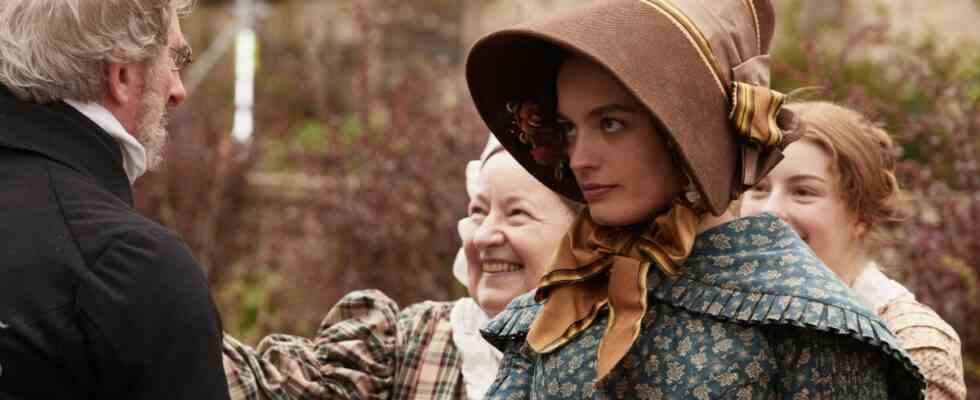It’s amazing the certainty with which serious literary scholars claim that Emily Brontë invented the passion of Heathcliff and Catherine Earnshaw in Wuthering Heights without any personal experience. Now it must be admitted that the life of Emily Brontë, who died in 1848 at the age of just thirty, seems unusually tangible because so much of it remains, from plaited locks of hair to teacups to the sofa in the Brontës rectory in Haworth , in the moors of Yorkshire. That may give you a deceptive certainty that nothing could be hidden from posterity. Of course that’s never true.
Australian actress Frances O’Connor has now figured out an Emily herself for her directorial debut. In “Emily” she interweaves established knowledge with fantasy. She lets her heroine flow together with that of “Wuthering Heights”, in a sometimes wondrously coherent way. Emily (Emma Mackey) and her sisters Charlotte and Anne live with their father, the Reverend Patrick Brontë, who raises his children in a mixture of artistic free spirit and austerity educates. Branwell, the son, wants to be an artist, but he should, the daughters should also write and paint and write poems. Because they rarely leave the vicarage, it only fires their imaginations all the more – they envision their own universe, the Kingdom of Gondal and Angria, which will later inspire Tolkien. The sisters grow up between freedom and oppression, in tiny rooms, with infinity in front of the door.
Emily claims to the siblings’ horror that she is obsessed with her dead mother
With Frances O’Connor, they’re grown up. Emily is far too close to her brother, and then a man appears who charms Charlotte and conjures up a mysterious aggressiveness in Emily: William Weightman (Oliver Jackson-Cohen), the new chaplain, young and charming. She’s becoming more and more of a tomboy among young women, and one evening, as they’re sitting around the living room table playing some kind of charade, Emily pretends to be possessed by her dead mother’s ghost, to the horror of Weightman and her siblings. In every scene in the cramped vicarage and the wide moors surrounding it, you can sense Emily’s rejection being suppressed desire, Weightman’s alienation turning to affection.
Frances O’Connor manages to conjure up a wonderful atmosphere between the characters, letting the cold, barren Yorkshire landscape shape her story, just as it defines Wuthering Heights. And she succeeds in doing wonderful tricks. The forbidden closeness between Emily and Branwell touching through a sheet while hanging out laundry. A wondrous moment in which the two look into a house in the dark to the Lintons, who are actually characters from “Wuthering Heights”. As Emily becomes more Catherine in her nature, and Weightman and Branwell coalesce into Heathcliff, the seductive, forbidden stepbrother who will cruelly avenge Catherine’s loss in the novel. William Weightman is fact-based fiction – he really existed, and he was actually thought to be a particularly magical man; romantically it is more likely to be attributed to Anne, but who knows. The Victorian era is above all one of the prudish facades, what happened behind it had to be kept secret at all costs.
What’s a little strange about O’Connor’s film is the discrepancies that run counter to its narrative. It’s okay that the timings aren’t quite right – Weightman died in 1842, not shortly before Emily, and that anyone on a walk in Yorkshire in 1848 can be ruled out with a camera, but that doesn’t matter either. But why do you already see the spine of a book from “Wuthering Heights” in the first scene, on which the name Emily Brontë can be read? Why is her father toasting to success when, during Emily’s lifetime, the sisters’ novels were officially credited to the Bell brothers?
The Brontës’ story is one of repression, and so is O’Connor’s. The pseudonym is part of it – this wild, passionate novel, “Wuthering Heights”, was euphorically reviewed when it was still considered Ellis Bell’s, later, when the authors were known and only Charlotte was alive, so much wild experimentation was not granted to a woman and Wuthering Heights became a nasty book about people who loved and lived and avenged with far too much will of their own.
In the end, that says something about the fact that cinema lacks the tough producers who call their creatives to order. It’s a bit of a shame. Actually, “Emily” is a little masterpiece. Wuthering Heights has been filmed dozens of times, but Frances O’Connor, who put Catherine Earnshaw’s soul in Emily’s body, breathed life into it more than anyone before her.
Emily, UK 2022 – Directed and written by Frances O’Connor. Camera: Nanu Segal. Starring: Emma Mackey, Fionn Whitehead, Oliver Jackson-Cohen, Alexandra Dowling, Adrian Dunbar. Wild Bunch, 130 minutes.

